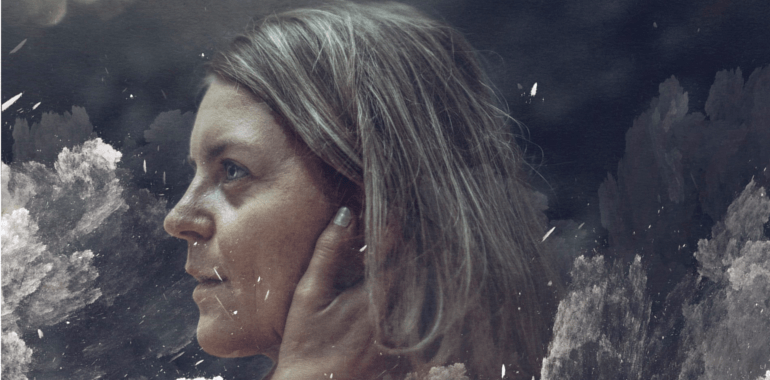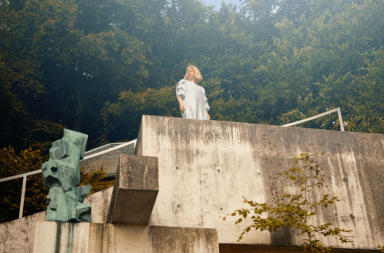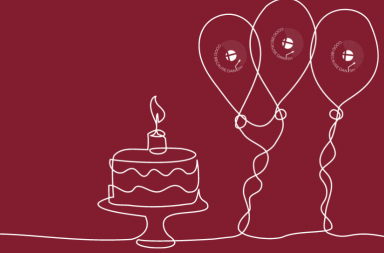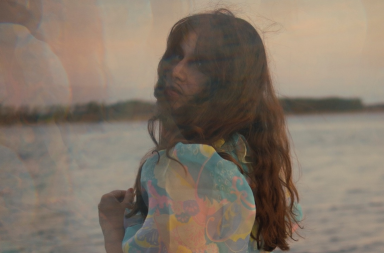
photo by Silvia Grav
There are project which are simply extraordinary and you can’t pass them by without stopping and diving into them. Nini Julia Bang‘s EP “A Thousand Tongues” is one of them. Today, we are truly honoured to premiere a video clip to one of the songs from the release – a hauntingly beautiful traditional Greek love song “Smyrneiko Minore”.
“Greek song on Good because Danish – what is going on?” – one might ask. The answers is hidden in the title of Nini Julia Bang’s EP.
“A Thousand Tongues” is a collection of six tracks that is a celebration of cross-cultural expression, each track in collaboration with different female musicians from different parts of the world. The EP dives into traditional songs reimagined. (…) “Smyrneiko Minore” is Bang’s interpretation of the traditional Greek song by Marika Papagika.”
This mesmerizing, eye (and ear) opening song, arranged in collaboration with Icelandic artist Sóley, is a heart-touching composition. It’s accompained by equaly stunning, thoughts-provoking video, by photographer Silvia Grav and theatre & film artist Samantha Shay.
The video presenting a recording of an underwather dance has something in it which forces you to watch evert little detail, every shadow and every ray of light showing on the screen. It creates a combination of emotions, all of them are very real and intense, yet come in a peaceful way through the black and white images. As Silvia Grav is a photographer, you can feel that what you see has a bit of the “photos brought to life”-vibe.
“I wanted to capture the complicity and agreements we make about pain and suffering, and how sometimes as humans we find it familiar and like a safe place, even when it’s the most dangerous and toxic thing for us. Nini and Sóley also created this kind of epic subterranean build.” – Samantha Shay on the video.
The song “Smyrneiko Minore”, along with the video, have an overwhelming effect. Once you hear the first tunes and see the first images, you are chained to them and in need to explore all the layers of them.
We were intrigued by the whole EP project of Nini Julia Bang and were able to ask her a few questions about the music and her very interesting background as a theatre artist and globetrotter. Read the interview below and let yourself get mesmerized by the video clip and the song “Smyrneiko Minore”.
Good because Danish: You always had an interest in cross-cultural expression. Political boundaries somehow create an image that other cultures are “different”. You went to Iran, India, and Tuva. What was your experience? What similarities did you discover?
Nini Julia Bang: Without a doubt, I have experienced more similarities than differences between people on all my many travels. One thing is the difference in political agenda and culture, but as soon as you go beyond that you see the human being, who most often is striving for exactly the same things in life as I am. I find that our core needs, dreams and values tend to be the same no matter what country I go to.
When I first went abroad it was such a contradicting experience because naturally, I would notice everything that was different from home, and at the same time, when I got to know the local people, I was surprised how similar they were to the people I grew up with.
You are not only a musician but also a theatre artist, how does combining these two passions and art crafts influence your creative process?
Theatre and music have always been naturally connected in my life.
I feel like a bearer of tradition. In both fields. In music I have been fortunate to work with incredible folk- and world music masters all around the globe, and in the theatre I have been a core member of Teatr ZAR, the resident theatre company of the Grotowski Institute, so I feel a deep responsibility to both of these traditions.
I always go as far as I can towards learning the tradition, before I turn around to bring it back to me. I know I will never be Bulgarian or Iranian – so I sing the songs and try to hear them from the inside. Sometimes for years and years. I strive to hear what they want to tell through me.
That is when I start to explore, create and re-compose the songs. In a way, I treat the songs as if they were a character I am trying to embody. And I often feel that they have their own will and temper which they want to express through me. And when I work with theatre I most often have a song inside of me as a subtle inner layer, even if I speak text etc. So by now, these two fields have become completely inseparable for me.
The EP “A Thousand Tongues” is an extraordinary piece of music and the story behind the idea as well. Why did you decide to record an EP like that?
It was a very natural process. I was a full-time singer and actress with Teatr ZAR for 8 years, and when I left the company I had a strong need to create a performance. I had all these songs inside of me that I had been carrying for so many years and they were starting to become physical, I could see and feel them more and more. I knew they had to become a performance. So, with the help of my talented friend and director Samantha Shay, I created the solo performance “A Thousand Tongues”, which premiered at the Theatre Olympics in 2016.
After the premiere, it was a natural step for me to take all the music from the performance and find a way to make it into an EP. I was aware that I couldn’t translate it directly, as the visuals and the physicality plays a huge part in the performance, and I wanted the record to stand on its own. So together with my label, Source Material, I invited four Icelandic producers (Sóley, JFDR, Kira Kira and Áslaug Magnúsdottír) to collaborate with me, and that is the final EP.
And why these songs? Well, I love traditional songs and I find them important and beautiful like stones that will transform into diamonds through time. And I think they have a message for us.
On the EP you perform songs in different languages – do you think music can be a universal language? Does it make it easier to understand the song meaning, even without fully understand the lyrics, when we add a melody to the words?
When we hear a text spoken, we are often able to perceive the meaning or at least the underlying emotions, even if we do not understand the language.
When I have met people whom I do not share a common language with, it has always surprised me that we were still able to have some kind of conversation. Just through reading the body language and the melody of the words. And at other times I have met people who, as soon as they realise that I don’t speak their language, would shut down and not even try to understand. It is all a matter of choice – if we want to communicate we will find a way.
And when you then add a melody to the text, even more, emotions and meaning can be translated, still without understanding the words. In fact, recently I sang with a wonderful singer in Ukraine, for three hours we sat alone in an abandoned church in Lviv, singing together. And over and over again we would discover that if I sang a Nordic song with a certain theme, she would intuitively join in with a Ukrainian song in the same theme. So yes, I believe that songs carry information and stories that you can perceive without knowing anything about the culture or the language.




